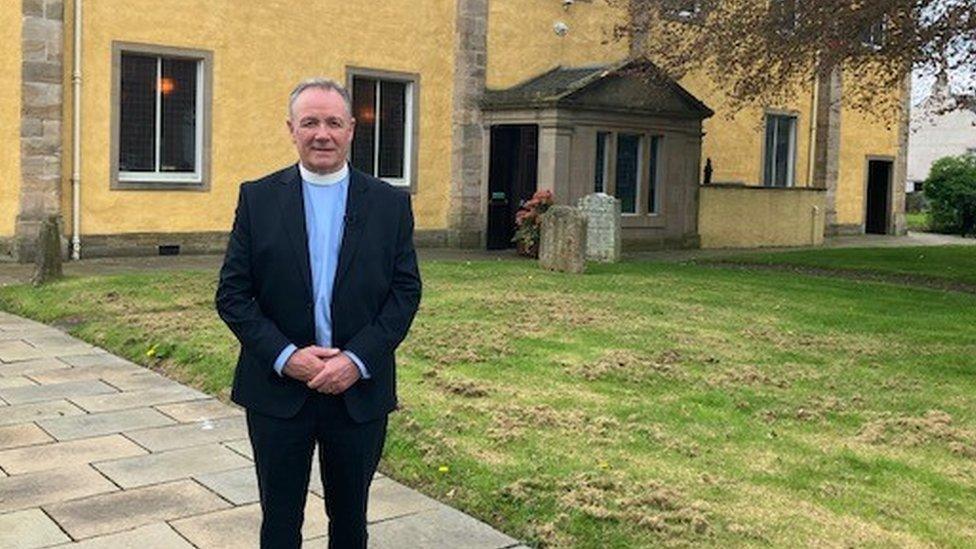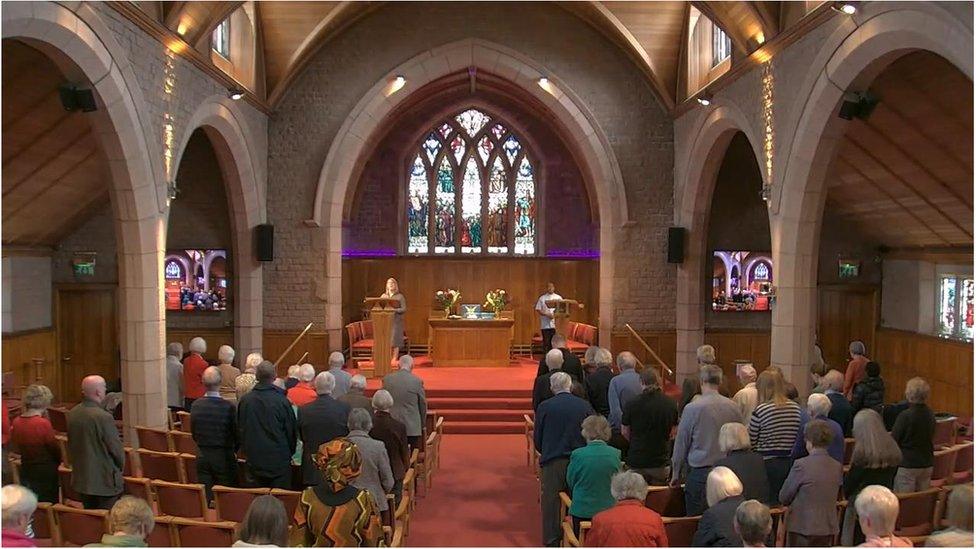Hundreds of churches will have to close, says Kirk
- Published

Reverend David Cameron will present a report to the General Assembly
The Church of Scotland will have to close hundreds of churches in the coming years, the Kirk's trustees have warned as it stages its annual General Assembly.
The gathering of Kirk leaders - including new moderator Rt Rev Sally Foster-Fulton - begins on Saturday in Edinburgh against a continuing backdrop of falling membership and dwindling income.
A report going before the Assembly this week states that about 60,000 people worship in person on a Sunday, compared to 88,000 pre-pandemic, with a growing number of people choosing to worship online or in "other ways".
The Kirk said having more than 1,000 churches to cater for the number of people attending was "simply untenable and unsustainable".
Reverend David Cameron, a parish minister and the convener of the Assembly Trustees, will present the report.
He said closing churches was a painful but necessary exercise.
"We feel first-hand what it means to people when they've gone to their local church, they've got married there, they've had their children baptised there, and they've buried their loved ones from there," he said.
"We recognise the real sorrow but we do have to rationalise our buildings in an appropriate way."

The Church of Scotland in numbers

According to 2021 numbers, the church has 283,600 members - down from a peak of 1.3 million in the late 1950s.
About 60,000 worship in person on a Sunday - down from 88,000 pre-Covid.
About 45,000 people now worship online and 8,275 in "other ways".
Each church averages just one wedding and one baptism per year - about 1,200 in total.
There were 50,000 per year in the late 1950s.
There were 430 professions of faith in 2021 (sometimes referred to as confirmation) compared with 40,000 at the peak of new members in the 1930s.
The average age of those attending church is 62.

Continuous decline
Reverend Cameron added that the Church of Scotland wanted its members to look with hope to the future.
He said: "Some churches will close but that will release a burden on many people, where there are only maybe 30 people there and of a generation that's now maybe finding it more difficult to manage.
"Uniting congregations brings a new lease of life and a new energy, and looking to the future in a way that's much more hopeful than trying to maintain the portfolio of property that we currently do."
The trustees said another problem was a lack of ministers, with more vacancies than ever before.
The vast majority of ministers are over the age of 50 and could retire in the next 10 years.
The church said this was putting lots of pressure on existing ministers to cover vacant parishes in addition to their own.
St Kentigern's in Kilmarnock, East Ayrshire, has been without a full-time minister for more than seven years.
As in other parishes, members of the congregation have taken on some of the roles of the minister.

New Church of Scotland moderator Rt Rev Sally Foster-Fulton, pictured with First Minister Humza Yousaf and Lord High Commissioner, Lord Hodge
Reverend Grant Barclay - who was the last minister at St Kentigern's - said more lay people being need to be involved.
He said: "Perhaps the job of ministry now is to encourage very many more people who thought their role was to sit in the pew to be up and take an active part in the whole work of the church, in worship-leading and preaching and in visiting people pastorally.
"The main difficulty we have is that people aren't coming forward and offering themselves for ministry, and even if they did the church might find it difficult in years to come to pay for them.
"So there's that double bind - a lack of people now and the potential lack of finances to pay for them in the future."
But as churches close, the Kirk is looking for alternative places and ways to reach out into communities.
At the Gyle shopping centre in Edinburgh, the Church of Scotland now has a space where people can hold meetings and come for advice or company.
Changes in society
The local Church of Scotland is the Old Parish at Corstorphine, where the minister is Reverend Moira McDonald.
She said having this space recognised the changes in society.
"It's about the church understanding what our role is," she said.
"It says 'we're here to serve the community'."
Rev McDonald said: "Our church is at one end of the parish and this is at the other end of the parish where people do different things.
"And the days of coming to church at half past ten or eleven o'clock in the morning one day a week, and the one-size fits all, that's well in the past so we're just kind of catching up with how life is."
Chaplain Esther Elliott said it might not be the type of church worshippers are used to but if fulfils a similar role.
"It gives a physical presence in a space where there are already relationships," she said.
"People come here to share their concerns, to share the good things in life and or share the quite horrible things of life as well.
"They come here to get support and information and to learn as well, which is really the task of the local church building."
There will be some difficult conversations at the General Assembly in the coming days about the future of the Church of Scotland.
Presbyteries have until 2025 to decide which churches will close, as the Kirk continues to look for new places and ways to work.

'Humbled, honoured and excited' to be new moderator

Rt Rev Sally Foster-Fulton addresses the General Assembly after being installed as moderator
The Church of Scotland's new moderator has said she is "beyond humbled, inexpressibly honoured and more than a wee bit excited" to be given the role.
Rev Sally Foster-Fulton was installed on the opening morning of the church's annual General Assembly in Edinburgh.
She said she was looking forward to meeting and encouraging people involved in church work at local, national and international levels at a time of unprecedented challenge and opportunity.
The new moderator told the Assembly: "There are hefty challenges facing the Church of Scotland, there are monumental challenges facing the world and the church is not exempt.
"Across our global neighbourhood we face a triple threat, ones that feed on each other - climate change, conflict and Covid.
"Together, they add pressure on wellbeing, a sense of home and culture, on finances and resources - and sadly unsurprising, it is the most vulnerable who suffer most.
"Being a living, breathing, reforming and loving body of Christ in this place continues to be the mission and ministry of the Church of Scotland."
Born and raised in South Carolina in the USA, Mrs Foster-Fulton is married to Rev Stuart Fulton, a fellow Church of Scotland minister who serves the parish of Newlands South Church in Glasgow.
The couple, who live in Glasgow, have two adult daughters.